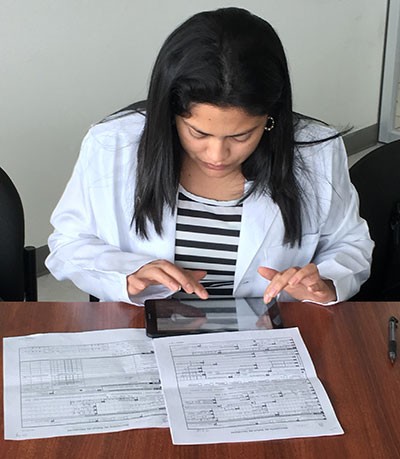- What We Do
- Agriculture and Food Security
- Democracy, Human Rights and Governance
- Economic Growth and Trade
- Education
- Ending Extreme Poverty
- Environment and Global Climate Change
- Gender Equality and Women's Empowerment
- Global Health
- Water and Sanitation
- Working in Crises and Conflict
- U.S. Global Development Lab

Improving HIV data collection in Honduras will help ensure access to life-saving services
November 2016–The Honduran Ministry of Health announced the national launch of four new data collection forms on September 22, 2016 – a crucial step toward ensuring access to life-saving HIV prevention and treatment services for tens of thousands of Hondurans.
The Ministry of Health, the U.S. Agency for International Development (USAID) and the U.S. President’s Emergency Plan for AIDS Relief (PEPFAR)-funded LINKAGES project and USAID/Honduras collaborated to create four simple forms for HIV counseling and testing, HIV care and treatment, patient follow-up and community-based HIV prevention. The new streamlined forms replace more than 100 previously in use throughout the country, enabling the ministry to simplify and standardize data collection, analysis and reporting.
For the first time, the forms also capture separate data on each key population the Ministry of Health’s HIV program seeks to reach – a breakthrough that officials, advocates and healthcare providers have hailed as a major accomplishment.
“We cover all the indicators the country needs to have an appropriate response to the HIV epidemic,” says Dr. Billy Gonzalez, head of the Ministry of Health’s Information Management Unit (Unidad de Gestión de la Información, or UGI).
Speakers at a launch event in Tegucigalpa also celebrated the introduction of a digital platform created by LINKAGES and UGI to support the Ministry of Health’s health management information system (HMIS). A first in the Central American region, this online platform allows health workers to fill out electronic versions of the new forms, using a mobile device or computer to enter HIV service data into the national HMIS.
Many Forms, No Key Population Data
LINKAGES seeks to improve access to, and sustained use of, the continuum of HIV prevention, care and treatment services among key populations affected by the virus. Tracking clients’ progress and identifying gaps in services is essential to ensuring that people receive the services they need in an efficient way.

In most countries, however, the national HMIS does not collect information by key population type. An assessment revealed that Honduras was no exception.
A LINKAGES team, led by Senior Monitoring and Evaluation Officer Andrew Igbo, conducted the assessment in collaboration with UGI. Team members visited 10 health facilities in the 2 largest cities of Honduras, examining methods, tools and protocols for data collection and the data systems and processes used. They found that staff were using multiple forms and formats, with some facilities using more than 20 forms for data collection.
“We found information stored in journals, notepads, emails and on scraps of paper,” Igbo says. “The assessment concluded that the widespread practice of using unstructured documents is an indication that internal processes are not being followed, which makes them susceptible to compliance risks, errors and omissions.”
The assessment report included the recommendation to collect data on specific key populations: sex workers, men who have sex with men and transgender people.
In April 2016, a workshop organized by LINKAGES Honduras brought together representatives from health facilities, the Ministry of Health and other stakeholders to explore how to simplify data forms and improve the HMIS. Participants agreed that LINKAGES would develop an initial draft of four consolidated forms to be reviewed by key stakeholders, refined and pilot tested. They also agreed on the need for an online platform that would enable health officials to monitor HIV prevention and care services through centralized, timely and secure access to data.
Toward National Implementation
In June 2016, LINKAGES Honduras conducted an online survey to gather feedback on the first draft of the new forms from 55 key stakeholders, including Honduran officials and HIV-services personnel, and representatives of international partners, civil society organizations, USAID and the Global Fund to Fight AIDS, Tuberculosis and Malaria. That feedback informed a second draft, which was pilot tested for 2 weeks with 45 participants in Tegucigalpa, San Pedro Sula and La Ceiba. Participants included HIV counselors, lab technicians and nurses from 11 Ministry of Health health facilities and 6 civil society organizations.
Those within the HIV and AIDS community understand the great need for simple and concise processes in controlling what is a complex epidemic. Honduras, through what may seem like an insignificant detail, is now on a path to improved data collection for key populations. This new approach, by way of four simplified forms, has potential in both accurately identifying and ensuring the country’s most hard to reach and overlooked populations are provided with the adequate care and services they need.
This document was made possible by the generous support of the American people through the U.S. Agency for International Development (USAID) and the U.S. President’s Emergency Plan for AIDS Relief (PEPFAR). The contents are the responsibility of the LINKAGES project and do not necessarily reflect the views of USAID, PEPFAR, or the United States Government. LINKAGES, a five-year cooperative agreement (AID-OAA-A-14-00045), is the largest global project dedicated to key populations. LINKAGES is led by FHI 360 in partnership with IntraHealth International, Pact, and the University of North Carolina at Chapel Hill.







Comment
Make a general inquiry or suggest an improvement.